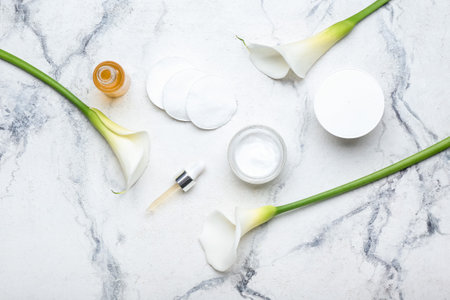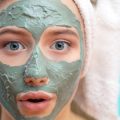1. Understanding Fragrance-Free vs. Unscented
When shopping for skincare or beauty products in the U.S., especially if you have sensitive skin, it’s important to understand the difference between “fragrance-free” and “unscented.” While these two terms might sound similar, they actually mean very different things—and knowing the difference can make a big impact on your skin health.
Fragrance-Free vs. Unscented: What’s the Difference?
Here’s a quick breakdown of what each term really means:
| Label | What It Means | Why It Matters for Sensitive Skin |
|---|---|---|
| Fragrance-Free | No added fragrance ingredients—synthetic or natural—are used in the product. | This is the safest choice for sensitive skin because it minimizes the risk of irritation or allergic reactions. |
| Unscented | The product may contain masking agents or small amounts of fragrance to neutralize odors, but it doesn’t have a noticeable scent. | Even though it may not smell like anything, it can still contain ingredients that irritate sensitive skin. |
Why This Matters for U.S. Consumers with Sensitive Skin
In the U.S., product labeling can be confusing because brands aren’t always required to list every fragrance ingredient individually. This makes it even more important for people with sensitive skin to pay attention to whether a product is truly fragrance-free. Choosing genuine fragrance-free options helps avoid potential flare-ups, redness, itching, or other allergic reactions commonly caused by hidden fragrances.
Quick Tip:
If you see “unscented” on a label, double-check the ingredient list. Look out for terms like “fragrance,” “parfum,” or “masking fragrance”—these are signs that the product might still cause irritation even if it doesnt have a strong smell.
Bottom Line
If your skin is easily irritated or prone to allergies, go for products clearly labeled as “fragrance-free.” It’s one of the simplest ways to protect your skin while still enjoying effective beauty and skincare routines.
2. Common Irritants Found in Fragranced Products
When you see “fragrance” listed on a beauty product label, it might seem harmless—but its often a blend of dozens or even hundreds of different chemicals. For people with sensitive skin, these hidden ingredients can be a major source of irritation, allergic reactions, and even flare-ups of chronic conditions like eczema or rosacea.
Whats Really Behind the Word “Fragrance”?
In the U.S., manufacturers are not required to disclose the individual components that make up a products fragrance due to trade secret protections. This means that a single word—“fragrance” or “parfum”—can actually represent a complex mixture of chemicals.
Common Ingredients Hidden in Fragrance
Many fragranced products contain irritants or allergens that are especially problematic for sensitive skin. Heres a look at some common culprits:
| Ingredient | Potential Effects on Sensitive Skin | Commonly Found In |
|---|---|---|
| Linalool | Can oxidize and cause allergic reactions when exposed to air | Perfumes, lotions, shampoos |
| Limonene | May lead to contact dermatitis after oxidation | Cleansers, moisturizers, body washes |
| Eugenol | Irritating to skin and eyes; potential allergen | Fragrances, essential oils, hair products |
| Cinnamal | Known skin sensitizer; can trigger eczema flare-ups | Perfumes, deodorants, skincare products |
| Citronellol | Mild irritant; may cause redness and itching in sensitive individuals | Scented creams, soaps, body sprays |
| Geraniol | Linked to allergic reactions; commonly flagged in patch tests for sensitivity | Scented lotions, toners, facial cleansers |
Why It Matters for Sensitive Skin Types
If you struggle with skin sensitivity, breakouts, or conditions like eczema or psoriasis, fragranced products could be making things worse. Even “natural” fragrances—like essential oils—can be irritating when used in high concentrations or not properly formulated. Choosing fragrance-free beauty products helps eliminate this risk and keeps your skincare routine gentle and safe.
Pro Tip:
Look for labels that say “fragrance-free” rather than “unscented.” Unscented products may still include masking fragrances to cover up other smells, which can still cause irritation.
![]()
3. The Rising Demand for Fragrance-Free Beauty in the U.S.
In recent years, theres been a noticeable shift in the beauty industry across the United States—more and more consumers are choosing fragrance-free products, especially those with sensitive skin. This growing demand is largely driven by Millennials and Gen Z, two generations that prioritize skin health, transparency, and clean beauty.
Why Are Millennials and Gen Z Choosing Fragrance-Free?
Younger shoppers are doing their homework. They read labels, follow dermatologists on social media, and watch countless skincare reviews before making a purchase. Unlike previous generations who may have been swayed by fancy packaging or celebrity endorsements, today’s consumers want ingredients that are gentle and effective.
Key Reasons Behind the Shift:
| Reason | Description |
|---|---|
| Sensitive Skin Awareness | More people are identifying as having sensitive skin and are avoiding common irritants like synthetic fragrances. |
| Transparency & Clean Beauty Movement | Consumers want to know what’s in their products. Fragrance-free often signals fewer unnecessary chemicals. |
| Social Media Influence | Dermatologists and influencers often recommend avoiding fragrance to prevent irritation and breakouts. |
| Inclusivity & Accessibility | Fragrance-free options are seen as more inclusive for people with allergies, asthma, or skin conditions like eczema. |
Retail Trends Reflecting the Shift
Major retailers like Target, Ulta Beauty, and Sephora now have dedicated sections for “sensitive skin” or “fragrance-free” skincare. Online platforms also offer filters so shoppers can easily find fragrance-free items. This trend isn’t just about preference—it’s becoming a new standard in skincare shopping.
Popular Fragrance-Free Brands Gaining Traction
- CeraVe
- The Ordinary
- Vanicream
- Eucerin
- Paulas Choice (selected products)
This growing awareness is pushing brands to reformulate existing products or launch entirely new lines without added fragrance. As this shift continues, its clear that fragrance-free beauty isnt just a passing trend—its becoming a key part of how younger Americans care for their skin.
4. Benefits of Going Fragrance-Free for Sensitive Skin
When it comes to caring for sensitive skin, going fragrance-free can make a big difference. Many skincare and beauty products contain added fragrances to enhance scent, but these can often lead to irritation, especially for those with reactive or allergy-prone skin. Choosing fragrance-free products helps reduce the chance of breakouts, redness, and inflammation.
Why Fragrances Can Be a Problem
Fragrances are one of the top causes of allergic reactions in skincare. They can be synthetic or natural, but both types have the potential to trigger sensitivity. Even if a product smells good, it might not be good for your skin—especially if your skin is already prone to dryness, eczema, or acne.
Common Reactions to Fragrances
| Reaction | Description |
|---|---|
| Redness | Inflamed patches on cheeks, forehead, or chin |
| Itching | Tingling or uncomfortable feeling after applying a product |
| Breakouts | Pimples or bumps triggered by irritation |
| Dryness | Skin becomes flaky or tight due to reaction |
| Swelling | Mild puffiness around eyes or lips |
The Advantages of Fragrance-Free Products
Using fragrance-free products gives your skin a better chance at staying calm and healthy. Here’s what you gain by making the switch:
1. Reduced Risk of Irritation
No added scents mean fewer harsh ingredients that could trigger a reaction.
2. Better for Allergy-Prone Skin
If you’ve ever experienced sneezing or rashes from scented lotions or creams, fragrance-free options are a safer bet.
3. Supports Healthy Skin Barrier
Your skins barrier works best when its not being disrupted by allergens or irritants like fragrance compounds.
4. Safer Around Eyes and Lips
The delicate areas around your eyes and mouth are more sensitive—fragrance-free formulas help avoid unwanted stinging or dryness.
Who Should Consider Fragrance-Free?
If you have any of the following skin conditions, switching to fragrance-free might be especially helpful:
- Eczema or psoriasis
- Rosacea-prone skin
- Sensitive or reactive skin types
- History of allergies to skincare products
- Teens and adults dealing with hormonal acne flare-ups
Going fragrance-free isn’t just a trend—it’s a smart choice for anyone looking to simplify their routine and protect their skin from unnecessary stress.
5. How to Build a Fragrance-Free Skincare Routine
If you have sensitive skin, switching to a fragrance-free skincare routine can make a big difference in reducing irritation and improving your skin’s overall health. Heres how to make the transition step by step.
Read Ingredient Labels Carefully
Fragrances can show up under different names, so its important to know what to look for. Always check the ingredient list before buying a product—even those labeled “unscented” may still contain masking fragrances.
Common Fragrance Terms to Avoid:
| Label Name | What It Means |
|---|---|
| Fragrance | Usually a mix of various scent chemicals |
| Parfum | Another term for synthetic fragrance blend |
| Essential Oils (e.g., lavender oil, citrus oil) | Natural but still potentially irritating for sensitive skin |
| Aroma | Often used as a synonym for fragrance |
| Masking Fragrance | Used to cover up chemical smells in products |
Simplify Your Routine
The fewer products you use, the less chance there is for irritation. Start with just the basics: cleanser, moisturizer, and sunscreen. Once your skin feels balanced, you can gradually add more steps if needed.
Basic Fragrance-Free Routine:
| Step | Product Type |
|---|---|
| 1 | Gentle Fragrance-Free Cleanser |
| 2 | Hydrating Fragrance-Free Moisturizer |
| 3 | Mild Fragrance-Free Sunscreen (SPF 30+) |
Patch Test New Products First
No matter how clean or gentle a product claims to be, always test it on a small area of your skin before applying it all over your face. This helps catch any unexpected reactions early.
Look for Trusted Brands That Offer Fragrance-Free Options
Certain skincare brands are known for being friendly to sensitive skin and offering truly fragrance-free options. Here are some reliable choices available in the U.S. market:
Recommended Brands:
- CeraVe – Dermatologist-developed and widely available at drugstores.
- Vanicream – Specializes in products free from common irritants including fragrance.
- Eucerin – Offers gentle skincare solutions, especially for dry and sensitive skin types.
- Aveeno – Their “Calm + Restore” line is popular among fragrance-free users.
- The Ordinary – Offers minimal-ingredient formulas without added fragrance.
Create a Transition Plan
You don’t need to throw away everything overnight. Replace one product at a time as you run out. This method is budget-friendly and gives your skin time to adjust.
Pro Tip:
If youre unsure whether a product is causing irritation, stop using all new items and reintroduce them one at a time every few days. This process—called an elimination approach—can help pinpoint triggers more easily.
Your path to calmer, happier skin starts with making smarter choices—starting with what you put on your face every day.


